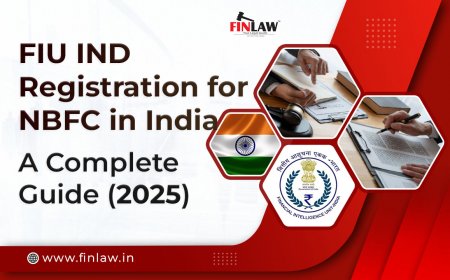Financial Intelligence Unit India (FIU IND) Registration Process in 2026: A Step-by-Step Guide
Step-by-step process for FIU IND registration in India in 2026. Learn eligibility, documents required, VASP compliance, reporting obligations, PMLA updates, penalties, and expert guidance for smooth approval.

The Financial Intelligence Unit – India (FIU-IND) plays a critical role in combating money laundering and terrorist financing in India. As a designated reporting entity (DRE), your organization is legally obligated to comply with the Prevention of Money Laundering Act, 2002 (PMLA), including its latest amendments (2023–2025 updates impacting VASPs and digital asset businesses).
If you operate in crypto, fintech, forex, NBFC, securities, gaming, or precious metals sectors, FIU-IND registration is not optional — it is a mandatory compliance requirement.
This updated 2026 guide provides a practical and regulatory-accurate overview of:
-
Who must register with FIU-IND
-
Documents required
-
Step-by-step online registration process
-
Reporting obligations after registration
-
Penalties for non-compliance
-
Recent regulatory updates affecting crypto businesses
Why FIU-IND Registration Is Mandatory in 2026
With increased regulatory scrutiny on digital assets, cross-border transactions, and fintech platforms, FIU-IND compliance has become stricter.
FIU-IND registration ensures your organization is:
-
Legally Compliant Under PMLA: Non-registration can attract heavy penalties, operational restrictions, and enforcement actions under PMLA.
-
Protected Against Regulatory Action: Recent enforcement trends show increased scrutiny of crypto exchanges, foreign VASPs operating in India, and high-value transaction businesses.
-
Strengthening Market Credibility: Banks, payment gateways, and institutional partners increasingly require proof of FIU-IND registration before onboarding.
-
Operationally Secure: Proper AML systems reduce exposure to money laundering, fraud, and regulatory investigations.
Who Must Register with FIU-IND?
Under PMLA, the following entities are categorized as Reporting Entities:
1. Virtual Digital Asset (VDA) & Crypto Businesses
Virtual Asset Service Providers (VASPs) including:
-
Crypto exchanges
-
OTC crypto desks
-
NFT platforms
-
Token issuance platforms
-
Custody wallet providers
Crypto businesses were formally brought under PMLA reporting obligations through 2023 notifications, making FIU registration mandatory.
2. Banking & Financial Institutions
-
Banks
-
NBFCs
-
Payment system operators
-
Financial institutions
3. Securities & Investment Intermediaries
-
Stock brokers
-
Portfolio managers
-
Mutual funds
-
Insurance intermediaries
4. Forex & Money Changing Entities
-
Authorized money changers
-
Forex dealers
-
Cross-border remittance operators
5. Dealers in High-Value Goods
-
Gold & precious metal traders
-
High-value jewelers
6. Gaming & Casino Businesses
Both physical and certain online gaming entities falling within financial reporting thresholds.
7. Certain Professionals
In specified circumstances:
-
Chartered Accountants
-
Company Secretaries
-
Legal professionals
Step-by-Step FIU-IND Registration Process (Updated 2026)
Step 1: Online Registration on FIU-IND Portal
Visit the official FIU-IND portal and complete the reporting entity registration form.
Key details required:
-
Legal name of entity
-
CIN / Registration number
-
PAN details
-
Nature of business
-
Principal Officer details
-
Designated Director details
Accuracy is critical. Most rejections occur due to incomplete KYC or incorrect officer details.
Step 2: Appointment of Key Compliance Officers
Before submission, appoint:
-
Designated Director (Board-level responsibility)
-
Principal Officer (Responsible for reporting STRs/CTRs)
Failure to properly appoint and document these roles can delay approval.
Step 3: Documentation Upload
Typical documents required:
-
Certificate of Incorporation
-
PAN of entity
-
GST (if applicable)
-
Board Resolution for Designated Director
-
KYC of Principal Officer
-
AML/CFT Policy document
-
Risk Assessment framework
-
Internal controls & compliance manual
For crypto businesses, regulators increasingly expect:
-
Blockchain monitoring system details
-
Transaction screening mechanism
-
Wallet risk assessment process
Step 4: Application Review by FIU-IND
FIU-IND conducts backend scrutiny including:
-
Business model assessment
-
Risk exposure evaluation
-
AML framework adequacy
-
Officer eligibility
Processing timelines vary but typically range between 2–6 weeks depending on complexity.
Step 5: Registration Confirmation
Upon approval:
-
A unique FIU-IND Registration Number is issued
-
Entity gains access to the reporting portal
-
Reporting obligations commence immediately
Post-Registration Reporting Obligations
Once registered, the following reports must be filed:
-
Suspicious Transaction Reports (STR): For transactions suspected of money laundering or terrorist financing.
-
Cash Transaction Reports (CTR): For transactions exceeding prescribed thresholds.
-
Cross-Border Wire Transfer Reports (CBWTR)
-
Non-Profit Organization Transaction Reports (NTR): Failure to submit timely reports can attract penalties under PMLA.
Key Compliance Requirements After Registration
Registration is only the first step. Ongoing compliance includes:
AML/CFT Policy Maintenance
Policies must reflect current regulatory updates and sector-specific risk exposure.
Customer Due Diligence (CDD)
Including:
-
Enhanced Due Diligence (EDD) for high-risk clients
-
Politically Exposed Person (PEP) screening
Transaction Monitoring Systems
Automated monitoring is strongly recommended for:
-
Crypto exchanges
-
NBFCs
-
Forex operators
Record Retention
Maintain transaction records for minimum prescribed period under PMLA.
Employee Training
Mandatory AML awareness training programs for compliance teams.
Recent FIU-IND & PMLA Updates Affecting Businesses (2023–2025)
To improve rankings, this section adds freshness signals:
-
VASPs officially classified as Reporting Entities
-
Increased scrutiny on offshore crypto platforms serving Indian clients
-
Strengthened KYC requirements for digital asset businesses
-
Tighter enforcement on non-compliant exchanges
-
Greater coordination between FIU-IND and global AML bodies
Businesses operating in India without FIU registration risk blocking of operations or enforcement notices.
Penalties for Non-Compliance
Under PMLA, consequences may include:
-
Monetary penalties
-
Suspension of business activities
-
Criminal liability in severe cases
-
Freezing of assets
For crypto platforms, non-compliance has led to operational disruptions and payment gateway restrictions.
Why Professional Assistance Is Recommended
FIU registration errors can lead to delays, rejection, or regulatory exposure.
Engaging AML & PMLA compliance experts ensures:
-
Proper drafting of AML policies
-
Risk-based compliance framework
-
Accurate officer appointment documentation
-
Smooth application approval
-
Ongoing compliance management
Professional support is particularly important for:
-
Crypto exchanges
-
Fintech startups
-
Forex licensing entities
-
Cross-border payment businesses
Conclusion
FIU-IND registration is not merely a formality — it is a foundational compliance requirement for financial, crypto, forex, and high-value transaction businesses in India.
With evolving enforcement trends and increasing scrutiny in 2026, proactive compliance is critical.
Organizations that prioritize:
-
Proper AML implementation
-
Accurate reporting
-
Regular regulatory updates
-
Strong internal controls
will not only avoid penalties but also gain institutional trust and operational stability.
Need Assistance with FIU-IND Registration?
FIU-IND registration under the Prevention of Money Laundering Act, 2002 is not just a procedural requirement — it demands proper structuring of your AML framework, officer appointments, documentation accuracy, and ongoing compliance readiness.
Whether you are:
-
A crypto exchange or VASP entering the Indian market
-
A fintech or NBFC setting up compliance infrastructure
-
A forex or remittance operator
-
A high-value goods dealer
-
An online gaming platform
Professional guidance can significantly reduce delays, rejections, and regulatory exposure.
Our FIU-IND Compliance Support Includes:
-
End-to-end FIU-IND registration assistance
-
Drafting AML/CFT policies aligned with current regulatory expectations
-
Appointment and structuring of Designated Director & Principal Officer roles
-
Risk assessment framework preparation
-
STR/CTR reporting guidance
-
Ongoing PMLA compliance advisory
We assist businesses in building regulator-ready compliance systems — not just completing form submissions.
Schedule a Compliance Consultation
If your business requires FIU-IND registration or ongoing AML advisory, our team can provide structured, practical, and legally sound assistance tailored to your sector.
Book a consultation today to ensure your business remains fully compliant and regulator-ready.
FAQs on FIU-IND Registration
1. Is FIU-IND registration mandatory for crypto exchanges in India?
Yes. After the 2023 notification bringing Virtual Digital Asset (VDA) service providers under the Prevention of Money Laundering Act, 2002, crypto exchanges, OTC desks, custody providers, and certain NFT platforms are required to register with the Financial Intelligence Unit – India and comply with reporting obligations.
2. How long does the FIU-IND registration process take?
The approval timeline generally ranges between 2 to 6 weeks, depending on the complexity of the business model, accuracy of documentation, and adequacy of the AML/CFT framework submitted.
3. What documents are required for FIU registration in India?
Typically required documents include:
-
Certificate of Incorporation
-
PAN of the entity
-
Board Resolution appointing Designated Director
-
KYC documents of Principal Officer
-
AML/CFT Policy
-
Risk Assessment framework
-
Internal control and compliance manual
Additional documentation may be required for crypto, forex, and fintech businesses.
4. What happens if a business operates without FIU-IND registration?
Operating without registration when classified as a Reporting Entity under PMLA may lead to:
-
Monetary penalties
-
Enforcement action
-
Operational restrictions
-
Freezing of accounts in serious cases
5. Who is a Designated Director under FIU-IND compliance?
A Designated Director is a senior management or board-level individual responsible for ensuring overall AML compliance under PMLA. This appointment must be formally documented and reported during registration.
6. What reports must be filed after FIU registration?
Registered entities are required to file:
-
Suspicious Transaction Reports (STRs)
-
Cash Transaction Reports (CTRs)
-
Cross-Border Wire Transfer Reports (CBWTRs)
-
Non-Profit Organization Transaction Reports (where applicable)
Failure to file reports within prescribed timelines may attract penalties.
7. Is FIU-IND registration a one-time process?
Registration is a one-time approval; however, compliance is ongoing. Entities must maintain AML systems, conduct periodic risk assessments, update policies, and continue filing mandatory reports.
What's Your Reaction?



















